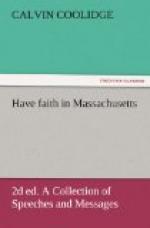Earth’s great lesson is written here. In it all men may read the interpretation of the founder of this college, of the meaning of America, of the motive high and true which has inspired her soldiers. Not unmindful of a desire for economic justice but scorning sordid gain, not seeking the spoils of war but a victory of righteousness, they came, subordinating the finite to the infinite, placing their trust in that which does not pass away. This precept heretofore observed must not be abandoned now. A desire for the earth and the fullness thereof must not lure our people from their truer selves. Those who seek for a sign merely in a greatly increased material prosperity, however worthy that may be, disappointed through all the ages, will be disappointed now. Men find their true satisfaction in something higher, finer, nobler than all that. We sought no spoils from war; let us seek no spoil from peace. Let us remember Babylon and Carthage and that city which her people, flushed with purple pride, dared call Eternal.
This college and her sons have turned their eyes resolutely toward the morning. Above the roar of reeking strife they hear the voice of the founder. Their actions have matched their vision. They have seen. They have heard. They have done. I thank you for receiving me into their company, so romantic, so glorious, and for enrolling me as a soldier in the legion of Colonel Ephraim Williams.
XLI
CONCERNING TEACHERS’ SALARIES
OCTOBER 29, 1919
A Letter to the Mayor of Boston
MY DEAR MR. MAYOR:
It will be with a good deal of satisfaction that I cooeperate with you and any other cities of Massachusetts for the purpose of increasing the pay of those engaged in the teaching of the youth of our Commonwealth. It has become notorious that the pay for this most important function is much less than that which prevails in commercial life and business activities.
Roger Ascham, the teacher to Queen Elizabeth, about 1565, in discussing this question, wrote: “And it is pity that commonly more care is had, yea and that among very wise men, to find out rather a cunning man for their horse than a cunning man for their children. They say nay in word, but they do so in deed. For to the one they will gladly give a stipend of two hundred crowns by the year and are loath to offer to the other two hundred shillings. God that sitteth in Heaven laugheth their choice to scorn and rewardeth their liberality as it should. For he suffereth them to have tame and well-ordered horses, but wild and unfortunate children, and therefore in the end they find more pleasure in their horse than comfort in their children.”
In an address which I made at a Harvard College Commencement I undertook to direct attention to the inadequate compensation paid to our teachers, whether in the universities, public schools, or the pulpits of the land. It is perfectly clear that more money must be provided for these purposes, which surpass in their importance all our other public activities, both by government appropriation and by private charity.




